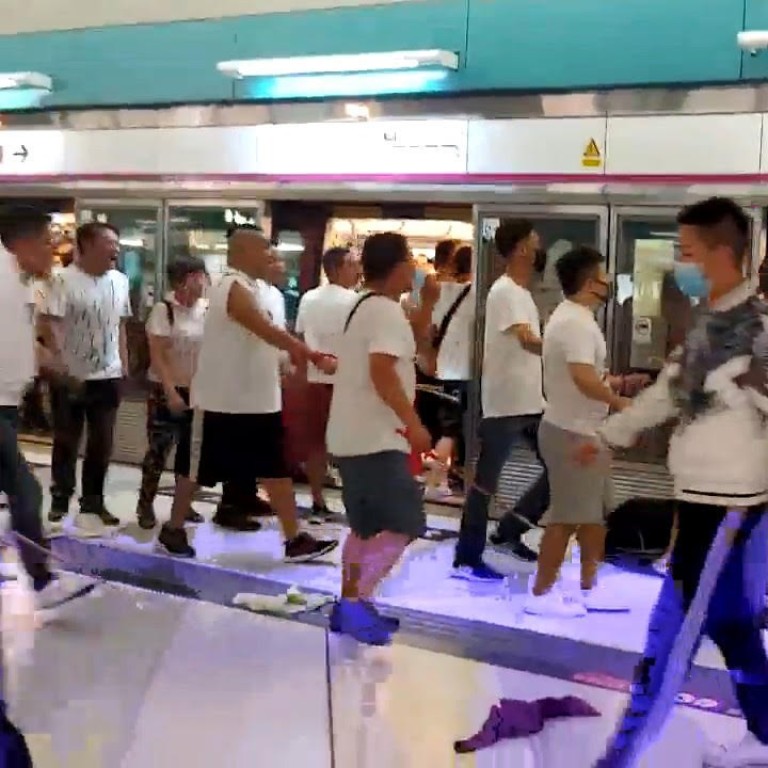
Hong Kong police left ‘dejected and discouraged’ by corruption watchdog’s investigation over violent Yuen Long attacks
- Independent Commission Against Corruption reportedly set to look into allegations of misconduct
- But some officers want leaking of investigation to be subject of its own inquiry
The investigation by Hong Kong’s corruption watchdog into allegations of police misconduct over the violent Yuen Long mob attack has left some members of the embattled force dejected, while a police association asked how the supposedly confidential inquiry had been leaked.
But even as officer morale takes a hit from the move by the Independent Commission Against Corruption (ICAC), which was created in 1974 as the city was going through a period of rampant police corruption, critics doubt that the investigation will cool public anger against the force.
According to sources, the ICAC has set up a dedicated group to look at claims that police colluded with the men who attacked anti-government protesters and passers-by indiscriminately at the Yuen Long MTR station on the night of July 21.
Protesters remain angry that it took the police so long to arrive at the scene, and that when they did, the estimated 100 attackers had already left the station.
Speaking on condition of anonymity, a senior police officer said: “We are now in the middle of an operation to restore social order. But our colleagues are being investigated for misconduct.
“We are unhappy, but there is nothing we can do. We can’t stop the probe. The ICAC is also doing their job in response to a complaint.”
A middle-ranking police officer, who also wished to remain anonymous, said the corruption watchdog had overreacted by launching the investigation.
“Colleagues are feeling dejected and discouraged because we feel the swift and high-profile intervention by the ICAC is out of proportion,” he said.
Gun-toting officer feared for his life after helmet snatched, police say
Lam Chi-wai, president of the Junior Police Officers’ Association, which represents 25,000 of the city’s 30,000 officers, wants the leak investigated.
“If this investigation indeed exists, and that it was leaked, then I believe a probe should be conducted to look into the leak. That is needed to ensure the public’s confidence in the confidentiality of the ICAC’s probe,” Lam said.
He declined to talk about the impact of the investigation on officers, while police also declined to comment on the matter.
Hong Kong has been rocked by a spate of protests since early June over the government’s now-abandoned plan to pass a bill that could see criminal suspects transferred to jurisdictions the city does not have extradition agreements with, including mainland China.
The relationship between police and the public has been soured by clashes with protesters, who have accused officers of using excessive force and have called on the government to set up an independent inquiry.
The Hong Kong and Macau Affairs Office under the State Council, China’s cabinet, on Monday heaped praise and threw its support behind Hong Kong’s embattled police force in a surprise news conference.
During a regular daily briefing on Wednesday, China’s foreign ministry spokesman Hua Chunying urged journalists not to point their cameras only at police, but at the violence by protesters to ensure that images presented to the world were more comprehensive and accurate.
Cathay pilot and 16-year-old among Hongkongers bailed on riot charges
Democratic Party lawmaker Lam Cheuk-ting, who is a former ICAC investigator, did not think that the watchdog’s inquiry could soothe public anger towards police, because it would only look into the conduct of officers in Yuen Long on July 21, and not at their conduct since protests erupted last month.
“The whole controversy of the police’s approach to protesters is much bigger than only what happened in Yuen Long,” Lam said.
Political commentator Johnny Lau Yui-siu agreed that the investigation would not calm the anti-police sentiment at this stage, and said the public remained sceptical of the agency when it came to sensitive cases.
The ICAC was set up in 1974 by the government to crack down on rampant corruption in the city, and during its early years it was despised by many citizens, civil servants and police officers who missed the extra money from pay-offs.
In 1977, dozens of police officers stormed the ICAC offices, punching staff.
But over the years, the watchdog has taken on many cases of police corruption. According to its annual reports, 14 police officers were convicted for corruption or related charges in 2000, 11 in 2010, and three last year.
Additional reporting by Clifford Lo and Danny Mok

